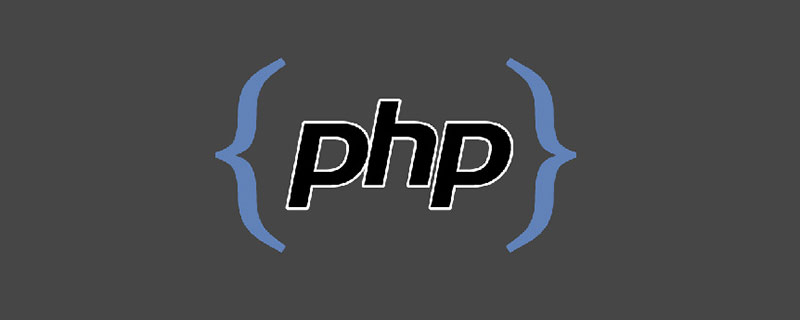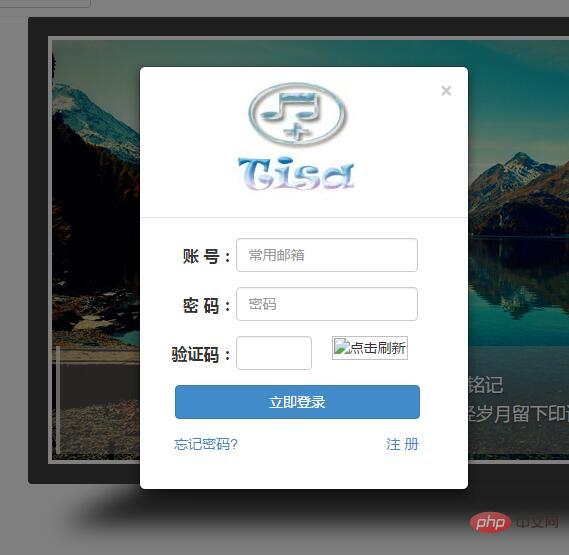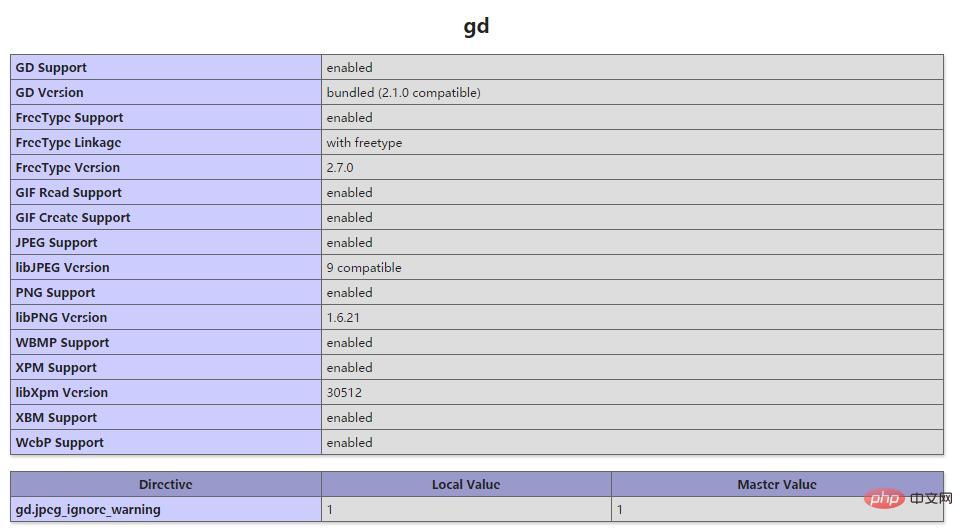 Backend Development
Backend Development
 PHP Problem
PHP Problem
 What should I do if the php verification code does not display the picture?
What should I do if the php verification code does not display the picture?
What should I do if the php verification code does not display the picture?
The solution to the problem that the php verification code does not display the image: 1. Remove the semicolon in ";extension=php_gd2.dll" in the php.ini file; 2. Change the encoding format of the code to a BOM-free format ;3. Use ob_clean to clear the cache.

Recommended: "PHP Video Tutorial"
The operating environment of this tutorial: Windows 7 system, PHP version 5.6. This method is suitable for all brands of computers.
The solution to the problem that the php verification code does not display the image:
Problem

Today I created a new virtual host locally and deployed a small PHP website that I wrote before. Because I used the wamp integrated environment before, this situation did not occur. Now I suddenly find that the verification code cannot be generated.
So I started my journey to find bugs. I searched for many solutions on the Internet and finally solved it. Now I share it as follows:
bug1
When the above situation occurs, the final solution is A basic mistake is that you probably forget to install the gd module in php.
In the window environment, you only need to find it in the php.ini file
;extension=php_gd2.dll
Just remove the semicolon in front of it. After restarting apache, you can find this in phpinfo()

If you are under the ubuntu environment, you need to install the gd module. The command is
sudo apt-get install php5-gd
After installation, you can also see the above module.
bug2
If you find that it still doesn’t work after the above installation, then it may be the following problem
Your code is probably using something like If edited with a text editor such as editpuls or notepad, their default encoding format is utf-8 with BOM.
UTF-8 BOM is also called UTF-8 signature. In fact, UTF-8 BOM has no effect on UFT-8. It is added to support UTF-16 and UTF-32
BOM, BOM signature means telling the editor what encoding the current file uses to facilitate the editor's identification, but although the BOM is in the editor
will not be displayed, but output will be generated, just like an extra blank line.
Generally I use UTF-8 BOM-free format
So you need to change the encoding format of the code to BOM-free format.
bug3
#If you go through the above two steps and find that it still doesn’t work, then you have to use your trump card.
Use ob_clean() and clear the cache.
ob_clean This function is used to discard the contents of the output buffer. If you have many generated image files, then if you want to access them correctly, you must Clear the buffer frequently.
public function create()
{
ob_clean();
$a = new verify();
session::set('captcha', strtolower($a->create(4, 15)));
view::assign("captcha", $a);
view::display("captcha");
exit(0);
}Now, everyone can see that it is back to normal

##
Note: If you use a higher php version, you cannot use undefined variables, otherwise a notice error will be reported, $new_number and $_SESSION['check_checks'] are in You must use isset to check before use, or if you use old code, add error_reporting(E_ALL & ~E_NOTICE) at the beginning; to block the notice error (not recommended), so use isset() to check to ensure that it is defined. . Otherwise, the verification code may not be displayed.
The above is the detailed content of What should I do if the php verification code does not display the picture?. For more information, please follow other related articles on the PHP Chinese website!

Hot AI Tools

Undresser.AI Undress
AI-powered app for creating realistic nude photos

AI Clothes Remover
Online AI tool for removing clothes from photos.

Undress AI Tool
Undress images for free

Clothoff.io
AI clothes remover

AI Hentai Generator
Generate AI Hentai for free.

Hot Article

Hot Tools

Notepad++7.3.1
Easy-to-use and free code editor

SublimeText3 Chinese version
Chinese version, very easy to use

Zend Studio 13.0.1
Powerful PHP integrated development environment

Dreamweaver CS6
Visual web development tools

SublimeText3 Mac version
God-level code editing software (SublimeText3)

Hot Topics
 How to Implement message queues (RabbitMQ, Redis) in PHP?
Mar 10, 2025 pm 06:15 PM
How to Implement message queues (RabbitMQ, Redis) in PHP?
Mar 10, 2025 pm 06:15 PM
This article details implementing message queues in PHP using RabbitMQ and Redis. It compares their architectures (AMQP vs. in-memory), features, and reliability mechanisms (confirmations, transactions, persistence). Best practices for design, error
 What Are the Latest PHP Coding Standards and Best Practices?
Mar 10, 2025 pm 06:16 PM
What Are the Latest PHP Coding Standards and Best Practices?
Mar 10, 2025 pm 06:16 PM
This article examines current PHP coding standards and best practices, focusing on PSR recommendations (PSR-1, PSR-2, PSR-4, PSR-12). It emphasizes improving code readability and maintainability through consistent styling, meaningful naming, and eff
 How Do I Work with PHP Extensions and PECL?
Mar 10, 2025 pm 06:12 PM
How Do I Work with PHP Extensions and PECL?
Mar 10, 2025 pm 06:12 PM
This article details installing and troubleshooting PHP extensions, focusing on PECL. It covers installation steps (finding, downloading/compiling, enabling, restarting the server), troubleshooting techniques (checking logs, verifying installation,
 How to Use Reflection to Analyze and Manipulate PHP Code?
Mar 10, 2025 pm 06:12 PM
How to Use Reflection to Analyze and Manipulate PHP Code?
Mar 10, 2025 pm 06:12 PM
This article explains PHP's Reflection API, enabling runtime inspection and manipulation of classes, methods, and properties. It details common use cases (documentation generation, ORMs, dependency injection) and cautions against performance overhea
 PHP 8 JIT (Just-In-Time) Compilation: How it improves performance.
Mar 25, 2025 am 10:37 AM
PHP 8 JIT (Just-In-Time) Compilation: How it improves performance.
Mar 25, 2025 am 10:37 AM
PHP 8's JIT compilation enhances performance by compiling frequently executed code into machine code, benefiting applications with heavy computations and reducing execution times.
 How Do I Stay Up-to-Date with the PHP Ecosystem and Community?
Mar 10, 2025 pm 06:16 PM
How Do I Stay Up-to-Date with the PHP Ecosystem and Community?
Mar 10, 2025 pm 06:16 PM
This article explores strategies for staying current in the PHP ecosystem. It emphasizes utilizing official channels, community forums, conferences, and open-source contributions. The author highlights best resources for learning new features and a
 How to Use Asynchronous Tasks in PHP for Non-Blocking Operations?
Mar 10, 2025 pm 04:21 PM
How to Use Asynchronous Tasks in PHP for Non-Blocking Operations?
Mar 10, 2025 pm 04:21 PM
This article explores asynchronous task execution in PHP to enhance web application responsiveness. It details methods like message queues, asynchronous frameworks (ReactPHP, Swoole), and background processes, emphasizing best practices for efficien
 How to Use Memory Optimization Techniques in PHP?
Mar 10, 2025 pm 04:23 PM
How to Use Memory Optimization Techniques in PHP?
Mar 10, 2025 pm 04:23 PM
This article addresses PHP memory optimization. It details techniques like using appropriate data structures, avoiding unnecessary object creation, and employing efficient algorithms. Common memory leak sources (e.g., unclosed connections, global v





